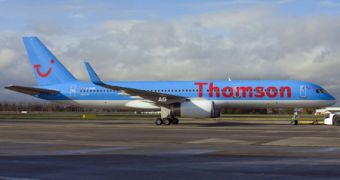Thomson Airways recently became the first UK airline to fly customers on sustainable biofuel. The historic flight, TOM 7446, carried 232 passengers on a Boeing 757-200 for the four hour flight from Birmingham Airport to Arrecife.
The sustainable biofuel used by Thomson Airways has been supplied by Dutch-based company SkyNRG, with Platinum Fuels as the fuel handler to fuel the aircraft.
Daily operations are projected to start from early 2012 for approximately six weeks. Birmingham Airport is supporting the sustainable biofuel operation through the provision of a dedicated fuel truck, independent technical oversight and storage infrastructure. The airline plans to expand its use of sustainable biofuels across its fleet.
“We firmly believe the adoption of sustainable biofuels by airlines will help achieve the Government’s carbon budget which commits the UK to reduce its carbon emissions by 50 per cent by 2025. Most strikingly, sustainable biofuel has the potential to reduce aviation emissions by up to 80 per cent in the long term,” stated Chris Browne, Thomson Airways Managing Director, before the flight.
However, green campaign group Friends of the Earth (FoE) seem to see differently. In their words, the flight was more of “a hollow PR stunt that paves the way for rainforest destruction”.
Thomson had originally planned to launch a series of test flights in July running on used cooking oil, but the company was unable to source enough fuel in time and had to postpone.
"Biofuels won't make flying any greener - their production is wrecking rainforests, pushing up food prices and causing yet more climate-changing emissions,” argued FoE’'s biofuels campaigner Kenneth Richter.
"It's not realistic to run daily flights to Lanzarote on used cooking oil - it would take about a hundred years for each passenger to save up enough chip fat.”
Whose side the government on?
“The government believes that sustainable biofuels have a role to play in efforts to tackle climate change, particularly in sectors where no other viable low carbon energy source has been identified—as is the case with aviation,” said U.K. Aviation Minister Theresa Villiers.

 14 DAY TRIAL //
14 DAY TRIAL //